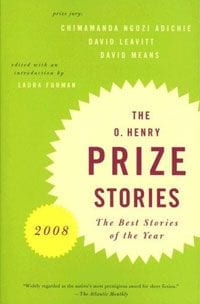
It’s not to say that the selections contained in The O. Henry Prize Stories 2008 are, as a rule, without merit. To make that sort of claim would defy critical logic by pretty much any acceptable manner of measurement. After all, you have the works of Alice Munro, Ha Jin, and Steven Milhauser contained within these estimable pages. But it would also defy logic to say that the book subtitled “The Best Stories of the Year” displays the kind of writing that is going to send readers dashing to their desks in the dead of night to pound out prose in a hopeless attempt to somehow match the deathless stories they have just themselves read.
More likely it will be followed by the sipping of a cup of tea which has gone somewhat lukewarm in the past couple hours of reading. For the book contains multitudes of professionally scripted short fiction, but very little that demands to be defined as “The Best”.
Overall, this wouldn’t be an issue if the book were subtitled “Some Very Good Stories Published This Year”. Or if they had simply stuck with the publisher’s stated goal for the prize collection (first published in 1919, only nine years after O. Henry’s death), that being “to strengthen the art of the short story”. If that had been the case, the response would simply be a quiet and respectful nod of assent. But “The Best”? It’s a tough argument to make.
Any kibitzing about the possibility of taking any 20 stories — officially all they have to be is in English and published in an American or Canadian periodical, but it helps if that periodical is The New Yorker, Granta, Tin House, or Zoetrope (accounting for half the volume’s stories between them) — is really, though, just a stalling method to avoid having to talk about the stories themselves. Not that there is anything particularly unworthy about this year’s 20, and in fact there are at least a few selections (those of Milhauser, Edward P. Jones, and Michel Faber in particular) that are worth crowing about. But a sense of tweedy perfectionism hangs about the whole volume, its source hard to discern but impossible to dispel once detected.
There are a couple stories here about China, which could be either coincidence or a harbinger of the country’s growing visibility in the eyes of the literary establishment, but either way should by any rights bring with them the Second Industrial Age clanging fervor of that country’s nonstop ferment. Instead, Anthony Doerr’s “Village 113” is a graceful elegy to the old ways, as an ancient village is slowly drowned by a new dam-created lake. For his part, Ha Jin’s “A Composer and His Parakeets” is nothing much more than an illustration of the title, well done but not terribly illuminating.
Alice Munro’s “What Do You Want to Know For?” is a similarly genial and unaffecting story about mortality and time’s scrubbing away of the past. Competently crafted, it nevertheless flickers into near invisibility when placed alongside the bright gameplay of Milhauser’s “A Change in Fashion”, A fantasia about a fashion designer named Hyperion whose massively baroque and architecturally-minded clothes championed a “new longing for hiddenness”, the story has a cheeky flair to it that one doesn’t normally associate with the prolix and generally old-fashioned Milhauser.
Possessed of a like-minded energy is Faber’s pungent mail-order-bride fable “Bye-bye Natalia”, in which a Slavic goth girl strikes up an email relationship with a frighteningly needy Middle American. Faber’s writing has a crackle to it quite unlike his rather elephantine first novel, The Crimson Petal and the White, and vividly transmits the yawning distance between these two: “Loneliness radiates from his emails like a nuclear aura, like a giant spill of industrial waste.”
Best of all is probably Edward P. Jones’ “Bad Neighbors”, which created a quite deserved stir when it was first published in The New Yorker. The story is ostensibly about the events that unfold in a tightly-knit black neighborhood in Washington, D.C. when the titular bad neighbors move in, but it’s really a sharp-focused look at the roiling discontent of simmering class warfare and the sharply delineated rules governing this particular corner of the city. Jones’s prose is densely layered but never overly complex, knowing that clarity and understatement are all important, like when illustrating the importance of a single letter in speech to one’s standing:
…one of the first things she herself had been taught early in life was never to drop the “g.” The “g” is there for a reason, they had told her. It separates you from all the rest of them, those who do not know any better.
The disappointment of The O. Henry Prize Stories 2008 comes in the more fallow stretches between these high points, when the stories begin to resemble more carefully executed outlines than living and breathing pieces of art. There is little bad writing on display, but almost as little great writing. That kind of evenness can quickly make one long for the unpredictability of The Best American Short Stories series. For better or worse, even the occasional worse always somehow ends up being better in the long run.

![Call for Papers: All Things Reconsidered [MUSIC] May-August 2024](https://www.popmatters.com/wp-content/uploads/2024/04/all-things-reconsidered-call-music-may-2024-720x380.jpg)



